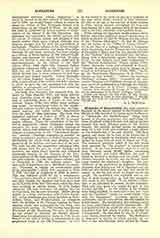

Alexander of Abonoteichos, the most notorious impostor of the second century of the Christian era. His life is fully described by Lucian in his Greek: Pseudomantis, or “Alexander, the Oracle-Monger.” Being intellectual, of pleasing appearance and captivating address, he gained many followers, not only in his own country but from different parts of, the Roman Empire. By cleverly devised oracles he prepared souls for a new birth and exhibited a huge serpent as the embodiment of his new divinity. His fame spread, and about 150 he built in his native city of Paphlagonia a temple to Esculapius, that was soon visited by many from all parts of Greece and Italy. The numerous questions asked of the new oracle were answered by “the prophet” in metrical predictions. In his most prosperous year he is said to have delivered nearly 80,000 replies, concerning bodily, mental, and social afflictions, for each of which he received a drachma and two oboli. Great officials consulted the oracle, and the Roman Rutilianus married the charlatan’s daughter. The nonfulfilment of his predictions he explained plausibly, declaring that Pontus was full of Christians and unbelievers who derided him, and that they should be stoned, or else his god would no longer favor the people. He established new mysteries and on the day of their inauguration he had this proclamation made in the temple: “If an Atheist, a Christian, or an Epicurean be present, let him withdraw. Then only may those who accept the god, do him worship joyfully.” As the objects of his aversion were being expelled, he continued to cry out: “Out with the Christians!” while the crowd added: “Out with the Epicureans!” Lewdness figured in the ceremonies, and his own private life was marked by licentiousness. He continued in this debasing career for many years before the public deserted him. He had predicted that he would die when 150 years old, translated from this sphere of action to another by a thunderbolt. He died when he was 70 of a loathsome disease, devoured by worms. The Pseudomantis is dedicated by Lucian to Celsus, possibly the author of the anti-Christian work refuted by Origen. Elsewhere decidedly hostile to the Christians as in “Peregrinus Proteus”, unquestionably Lucian is in this work favorable to them. He shows that while high and low were being led astray by the false mysticism of Alexander of Abonoteichos, the Christians held aloof from him, and with the Epicureans, with whom Lucian markedly contrasts them in the “Peregrinus“, shared the full measure of the archhypocrites hate. It is the testimony of an enemy, who here, at least, is no slanderer, but an unwilling apologist of Jesus Christ and His persecuted adherents.
JOHN J. A’ BECKET.

